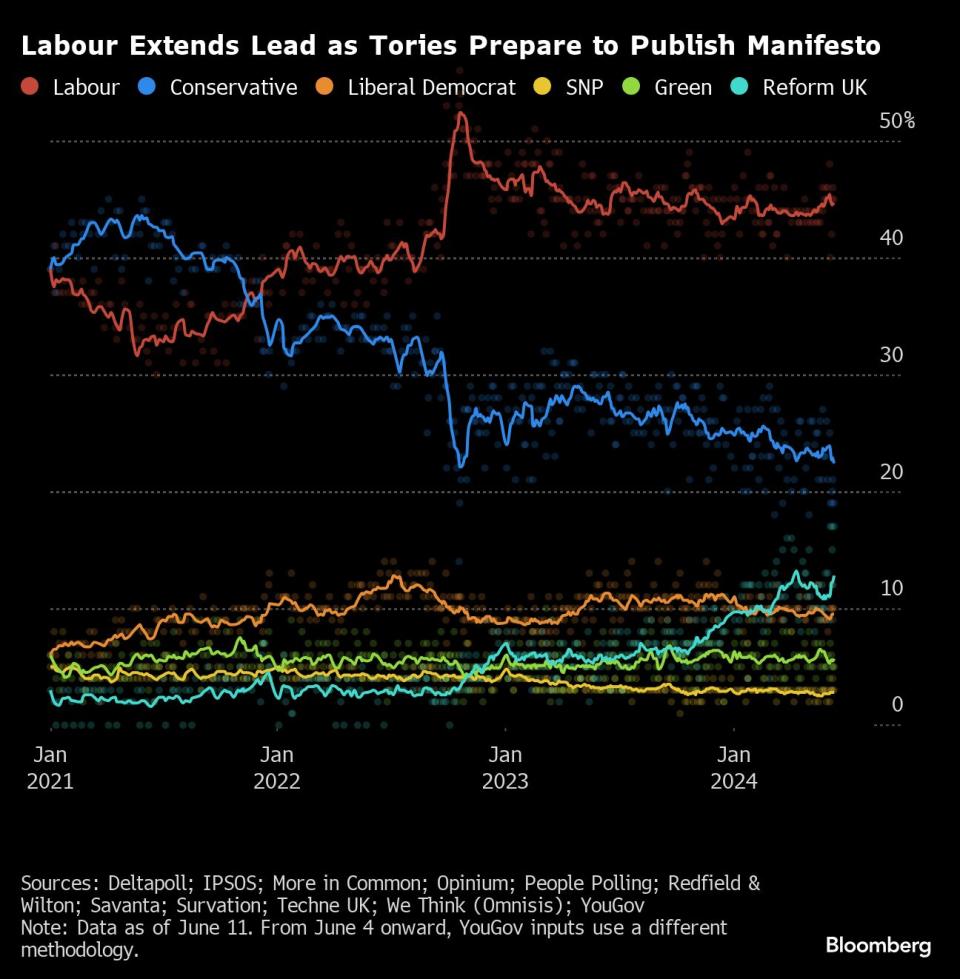Labour Needs Space to Move on UK Tax, Ex-Leader Kinnock Says
(Bloomberg) -- Labour Party leader Keir Starmer and his shadow chancellor, Rachel Reeves should leave themselves wriggle room to raise UK taxation if needed, former leader Neil Kinnock suggested, as the party’s current leadership faces increasing pressure to rule out an array of tax rises.
Most Read from Bloomberg
Hunter Biden Was Convicted. His Dad’s Reaction Was Remarkable.
US Inflation Broadly Cools in Encouraging Sign for Fed Officials
Fed Officials Dial Back Rate Forecasts, Signal Just One ‘24 Cut
Stock Bull Run Breaks Record on Fed Decision Day: Markets Wrap
Blinken Casts Doubt on Cease-Fire Hopes After Hamas Responds
“Every government needs room to maneuver” in office, Kinnock, who led Labour for almost a decade between 1983 and 1992, told Bloomberg on Tuesday in an interview at his home in London. “Five years is a very long time in fiscal regime: Neither voters nor politicians can escape that reality.”
With Labour leading the governing Conservatives by more than 20 points in national polling, Starmer looks increasingly likely to enter Downing Street as prime minister after the July 4 election. That’s led to increasing scrutiny over how Labour would fund its plans on energy, health care and education, after the leader and Reeves ruled out raising income tax, national insurance, value-added tax or corporation tax — the Treasury’s biggest money-raisers.
Starmer and his would-be ministers have been less categorical about whether Labour would be prepared to increase other levies — including capital gains tax — leading to speculation in the UK press that the party might spring a series of tax rises if they win power. Kinnock suggested that they’re wise not to back themselves into a corner.
On Tuesday, Reeves told reporters said she has “no plans” to raise taxes after the election other than what Labour has already announced. The party has said it plans to raise taxes on non-domiciled residents, private schools, private equity and oil and gas firms — fiscal moves that play to their voters.
“I want taxes to be lower,” Reeves said. “I do not want the tax burden to rise further.”
Tax remains a vulnerable area for Labour because Conservative Prime Minister Rishi Sunak has sought to make it a key dividing line between the two parties. On Tuesday, he unveiled the Tory election manifesto featuring a suite of tax cuts which the party said rise in value to £17.2 billion ($21.9 billion) a year by 2029-2030 — for a total over five years of £61.9 billion.
Sunak and his ministers have repeatedly pushed a line — rejected by Labour — that the opposition party would raise taxes by more than £2,000 in government. But that amount would be spread over four years, and is based in part on Tory assumptions about Labour policy.
It’s a trick Kinnock knows well: in the run-up to the 1992 election which he unexpectedly lost to John Major, the Conservatives produced a “Labour Tax Bombshell” campaign accusing him of planning to hit workers with tax rises. But Kinnock said the political context this time around means the “tax scare tactics won’t work.”
“Now is different: We’re operating against the background of scores of Tory tax rises,” Kinnock said. “Their reputation as a tax-cutting party is in shreds.”
That’s a reference to tax rises overseen by Sunak first as chancellor and then as prime minister that’s put the total UK tax burden at its highest in seven decades. Starmer, for his part, has spent the past four years trying to repair Labour’s reputation for managing the economy after it was badly damaged by the left-wing policies of his predecessor, Jeremy Corbyn.
“Labour has shown immense, understandable caution in costing its program, and in the constraints that it’s imposed on itself so far as tax policy is concerned,” Kinnock said.
Analysis by Bloomberg Economics shows that whoever wins the election, both Labour and the Conservatives will likely have to break their promises not to raise tax. After taking account of the likely paths of the day-to-day budgets of health, defense, education and foreign aid, remaining departmental budgets will need a boost of around £20 billion to keep pace with inflation, the analysis found.
Kinnock said that chronic under-investment in public services over the past 14 years means huge investment is needed to reverse “such a multiplicity of crises” across the public sector.
“It does require suspension of reality to some extent, to say politicians have got to be very candid about every last penny that they’re going to ask for,” because politicians have got to get elected in order to do “good things,” the party grandee said. “I hope the Labour government is going to treat the scale of crises as a mandate for big change.”
The prospect of Labour returning to government is an emotional one for Kinnock, who said that before Tony Blair won a landslide in 1997, the feeling that Labour could win an election remained absent for decades.
“It’s not all guesswork, some of it is to do with polling, some of it is to do with contact with just smelling the air,” he said, wiping away tears. He said it’s only in the last week that he realized “we’re not going to lose.”
--With assistance from Alan Crawford and Joe Mayes.
(Updates with further comment from Kinnock in final two paragraphs.)
Most Read from Bloomberg Businessweek
China’s Economic Powerhouse Is Feeling the Brunt of Its Slowdown
The World’s Most Online Male Gymnast Prepares for the Paris Olympics
As Banking Moves Online, Branch Design Takes Cues From Starbucks
Food Companies Hope You Won’t Notice Shortages Are Raising Prices
©2024 Bloomberg L.P.





